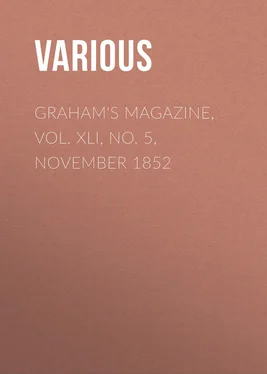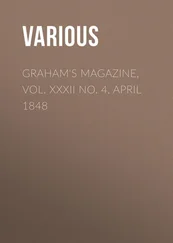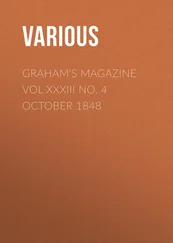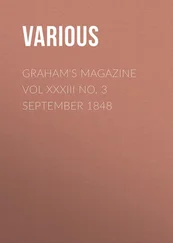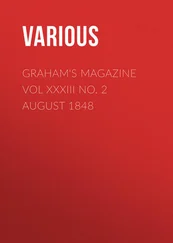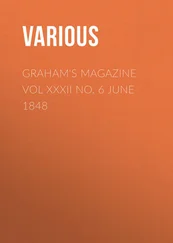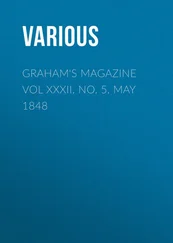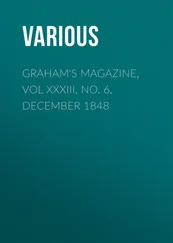Various - Graham's Magazine, Vol. XLI, No. 5, November 1852
Здесь есть возможность читать онлайн «Various - Graham's Magazine, Vol. XLI, No. 5, November 1852» — ознакомительный отрывок электронной книги совершенно бесплатно, а после прочтения отрывка купить полную версию. В некоторых случаях можно слушать аудио, скачать через торрент в формате fb2 и присутствует краткое содержание. Издательство: Иностранный паблик, Жанр: periodic, literature_19, foreign_edu, на английском языке. Описание произведения, (предисловие) а так же отзывы посетителей доступны на портале библиотеки ЛибКат.
- Название:Graham's Magazine, Vol. XLI, No. 5, November 1852
- Автор:
- Издательство:Иностранный паблик
- Жанр:
- Год:неизвестен
- ISBN:нет данных
- Рейтинг книги:4 / 5. Голосов: 1
-
Избранное:Добавить в избранное
- Отзывы:
-
Ваша оценка:
- 80
- 1
- 2
- 3
- 4
- 5
Graham's Magazine, Vol. XLI, No. 5, November 1852: краткое содержание, описание и аннотация
Предлагаем к чтению аннотацию, описание, краткое содержание или предисловие (зависит от того, что написал сам автор книги «Graham's Magazine, Vol. XLI, No. 5, November 1852»). Если вы не нашли необходимую информацию о книге — напишите в комментариях, мы постараемся отыскать её.
Graham's Magazine, Vol. XLI, No. 5, November 1852 — читать онлайн ознакомительный отрывок
Ниже представлен текст книги, разбитый по страницам. Система сохранения места последней прочитанной страницы, позволяет с удобством читать онлайн бесплатно книгу «Graham's Magazine, Vol. XLI, No. 5, November 1852», без необходимости каждый раз заново искать на чём Вы остановились. Поставьте закладку, и сможете в любой момент перейти на страницу, на которой закончили чтение.
Интервал:
Закладка:
If, when struck down from his pride of place by the crook-beaked blood-hound of the air, his legs were mercilessly broken, and his long bill thrust into the ground, that the falcon might dispatch him without fear of consequences, and at leisure, it was doubtless a source of pride to him, as to the tortured Indian at the stake, to be so tormented, since the amount of the torture was commensurate with the renown of the tortured; besides – for which the Bittern was, of course, truly grateful – it was his high and extraordinary prerogative to have his legs broken as aforesaid, and his long bill thrust into the ground, by the fair hand of the loveliest lady present – thrice blessed Bittern of the days of old.
A very different fate, in sooth, from being riddled with a charge of double Bs from a rusty flint-lock Queen Anne’s musket, poised by the horny paws of John Verity, and then ignobly cast to fester in the sun, among the up-piled eel-skins, fish-heads, king-crabs, and the like, with which, in lieu of garden-patch or well-trained rose-bush, the south-side Long Islander ornaments his front-door yard, rejoicing in the effluvia of the said decomposed piscine exuviæ , which he regards as “considerable hullsome,” beyond Sabæan odors, Syrian nard, or frankincense from Araby the blest!
Being eaten is being eaten after all; whether it be by a New Zealand war-chief, a New York alderman, a peerless lady, or a muck-worm; and I suppose it feels much the same, after one is once well dead; but, if I had my choice, I would most prefer to be eaten by the damoiselle of high degree, and most dislike to be battened on by the alderman, as being more ravenous and less appreciative than either Zealander or muck-worm.
The Bittern, however, be it said in sober earnest, although like many other delicious dishes prized by the wiser ancients, but now fallen into disuse, if not into disrepute – to wit, the heronschaw, the peacock, the curlew, and the swan – all first-rate dainties to the wise – is a viand not easily to be beaten, especially if he be sagely cooked in a well-baked, rich-crusted pastry, with a tender and fat rump-steak in the bottom of the dish, a beef’s kidney scored to make gravy, a handful of cloves, salt and black pepper quantum suff. , a dozen hard-boiled eggs, and a pint of scalding-hot port wine poured in just before you serve up.
What you say, is perfectly true, my dear madam, cooked in that manner an old India rubber shoe is good; not only would be, but is . But you’d better believe it, a Bittern is a great deal better. If you don’t believe me, try the Bittern, and then if you prefer it, adhere to the shoe.
But now to quit his edible qualifications and turn to his personal appearance, habits of life, and location, and other characteristics, we will say of him, in the words of Wilson, that eloquent pioneer in the natural history of America, that the American Bittern, whom it pleases the Count de Buffon to designate as Le Butor de la Baye de Hudson , “is another nocturnal species, common to all our sea and river marshes, though nowhere numerous. It rests all day among the reeds and rushes, and, unless disturbed, flies and feeds only during the night. In some places it is called the Indian Hen; on the sea-coast of New Jersey it is known by the name of dunkadoo , a word probably imitative of its common note. They are also found in the interior, having myself killed one at the inlet of the Seneca Lake, in October. It utters at times, a hollow, guttural note among the reeds, but has nothing of that loud, booming sound for which the European Bittern is so remarkable. This circumstance, with its great inferiority of size, and difference of marking, sufficiently prove them to be two distinct species, although, hitherto, the present has been classed as a mere variety of the European Bittern. These birds, we are informed, visit Severn river, at Hudson’s Bay, about the beginning of June; make their nests in swamps, laying four cinereous green eggs among the long grass. The young are said to be, at first, black.
“These birds, when disturbed, rise with a hollow kwa , and are then easily shot down, as they fly heavily. Like other night birds, their sight is most acute during the evening twilight; but their hearing is, at all times, exquisite.
“The American Bittern is twenty-seven inches long, and three feet four inches in extent; from the point of the bill to the extremity of the toes, it measures three feet; the bill is four inches long; the upper mandible black; the lower, greenish yellow; lores and eyelids, yellow; irides, bright yellow; upper part of the head, flat, and remarkably depressed; the plumage there is of a deep blackish brown, long behind and on the neck, the general color of which is a yellowish brown, shaded with darker; this long plumage of the neck the bird can throw forward at will, when irritated, so as to give him a more formidable appearance; throat, whitish, streaked with deep brown; from the posterior and lower part of the auriculars, a broad patch of deep black passes diagonally across the neck, a distinguished characteristic of this species; the back is deep brown, barred, and mottled with innumerable specks and streaks of brownish yellow; quills, black, with a leaden gloss, and tipped with yellowish brown; legs and feet, yellow, tinged with pale green; middle claw, pectinated; belly, light yellowish brown, streaked with darker; vent, plain; thighs, sprinkled on the outside with grains of dark brown; male and female, nearly alike, the latter somewhat less. According to Bewick, the tail of the European Bittern contains only ten feathers; the American species has, invariably, twelve. The intestines measured five feet six inches in length, and were very little thicker than a common knitting-needle; the stomach is usually filled with fish or frogs. 1 1 I have taken an entire water-rail from the stomach of the European Bittern. – Ed.
“This bird, when fat, is considered by many to be excellent eating.”
It is on the strength of Mr. Wilson’s statement as above that I have given among the vulgar appellations of this beautiful bird that of Dunkadoo ; though I must admit that I never heard him called a Dunkadoo , either on the sea-coast of New Jersey or any where else; and further must put it on record, that if the sea-coasters of New Jersey did coin the said melodious word as imitative of its common note , they proved much worse imitators than I have found them in whistling bay snipe, hawnking Canada geese, or yelping Brant. They might just as well have called him a Cockatoo , while they were about it.
The other name, Quawk , by which it is generally known both on the sea-coast of New Jersey, and every where else where the vernacular of America prevails, is precisely imitative of the harsh clanging cry with which he rises from the reeds in which he lurks during the day-time, and which he utters while disporting himself in queer clumsy gyrations in mid air, over the twilight marshes in the dusk of summer evenings; and how nearly Quawk approaches to Dunkadoo , that one of my readers who is the least appreciative of the comparative value of sweet sounds, can judge as well as I can.
In England the Bittern, who there is possessed of a voice between the sounds of a bassoon and kettle-drum, with which he makes a most extraordinary booming noise, which can be heard for miles, if not for leagues, over the midnight marshes, a noise the most melancholy and unearthly that ever shot superstitious horror into the bosom of the belated wayfarer, who is unconscious of its cause, has also been designated by the country people, from his cry, “the bog-bumper,” and the “bluttery bump” – but as our bird – the United Stateser, I mean, or Alleghanian, as the New York Historical Society Associates would designate their countrymen – Bittern never either booms, blutters or bumps, but only quawks; a quawk only he must be content to remain, whether with the sea-coasters of New Jersey, the south-siders of Long Island, or my friends, the Ojibwas of Lake Huron.
Читать дальшеИнтервал:
Закладка:
Похожие книги на «Graham's Magazine, Vol. XLI, No. 5, November 1852»
Представляем Вашему вниманию похожие книги на «Graham's Magazine, Vol. XLI, No. 5, November 1852» списком для выбора. Мы отобрали схожую по названию и смыслу литературу в надежде предоставить читателям больше вариантов отыскать новые, интересные, ещё непрочитанные произведения.
Обсуждение, отзывы о книге «Graham's Magazine, Vol. XLI, No. 5, November 1852» и просто собственные мнения читателей. Оставьте ваши комментарии, напишите, что Вы думаете о произведении, его смысле или главных героях. Укажите что конкретно понравилось, а что нет, и почему Вы так считаете.
